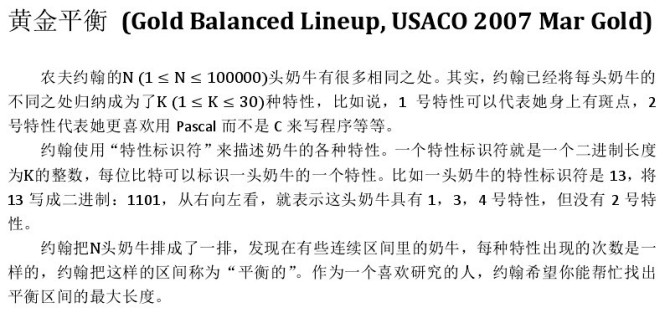| Time Limit: 2000MS | Memory Limit: 65536K | |
| Total Submissions: 13128 | Accepted: 3845 |
Description
Farmer John's N cows (1 ≤ N ≤ 100,000) share many similarities. In fact, FJ has been able to narrow down the list of features shared by his cows to a list of only K different features (1 ≤ K ≤ 30). For example, cows exhibiting feature #1 might have spots, cows exhibiting feature #2 might prefer C to Pascal, and so on.
FJ has even devised a concise way to describe each cow in terms of its "feature ID", a single K-bit integer whose binary representation tells us the set of features exhibited by the cow. As an example, suppose a cow has feature ID = 13. Since 13 written in binary is 1101, this means our cow exhibits features 1, 3, and 4 (reading right to left), but not feature 2. More generally, we find a 1 in the 2^(i-1) place if a cow exhibits featurei.
Always the sensitive fellow, FJ lined up cows 1..N in a long row and noticed that certain ranges of cows are somewhat "balanced" in terms of the features the exhibit. A contiguous range of cows i..j is balanced if each of the K possible features is exhibited by the same number of cows in the range. FJ is curious as to the size of the largest balanced range of cows. See if you can determine it.
Input
Lines 2.. N+1: Line i+1 contains a single K-bit integer specifying the features present in cow i. The least-significant bit of this integer is 1 if the cow exhibits feature #1, and the most-significant bit is 1 if the cow exhibits feature # K.
Output
Sample Input
7 3 7 6 7 2 1 4 2
Sample Output
4
Hint
Source

数组sum[i][j]表示从第1到第i头cow属性j的出现次数。
所以题目要求等价为:
求满足
sum[i][0]-sum[j][0]=sum[i][1]-sum[j][1]=.....=sum[i][k-1]-sum[j][k-1] (j<i)
中最大的i-j
将上式变换可得到
sum[i][1]-sum[i][0] = sum[j][1]-sum[j][0]
sum[i][2]-sum[i][0] = sum[j][2]-sum[j][0]
......
sum[i][k-1]-sum[i][0] = sum[j][k-1]-sum[j][0]
令C[i][y]=sum[i][y]-sum[i][0] (0<y<k)
初始条件C[0][0~k-1]=0
所以只需求满足C[i][]==C[j][] 中最大的i-j,其中0<=j<i<=n。
C[i][]==C[j][] 即二维数组C[][]第i行与第j行对应列的值相等,
那么原题就转化为求C数组中 相等且相隔最远的两行的距离i-j。
#include <iostream>
#include <stdio.h>
#include <algorithm>
#include <math.h>
#include <string.h>
#include <stdlib.h>
#include <vector>
#include <stack>
#include <queue>
#include <set>
#include <map>
using namespace std;
#define Max 100010
#define MOD 100007
struct Node
{
int pos;
int next;
};
Node node[Max];
int hashtable[Max];
int cur,n,k,ans,temp;
int c[Max][32];
bool check(int x)
{
for(int i=0;i<k-1;i++)
{
if(c[x][i]!=c[x][i+1]) return false;
}
return true;
}
void init()
{
cin>>n>>k;
ans=0;
for(int i=0;i<MOD;i++) hashtable[i]=-1;
for(int i=0;i<n;i++)
{
scanf("%d",&temp);
for(int j=0;j<k;j++)
{
c[i][j]=temp&1;
temp/=2;
}
}
for(int j=0;j<k;j++)
{
for(int i=1;i<n;i++) c[i][j]+=c[i-1][j];
}
for(int i=n-1;i>=0;i--)
{
if(check(i)) {ans=i+1;break;}
}
for(int j=0;j<k;j++)
{
for(int i=0;i<n;i++) c[i][j]-=c[i][k-1];
}
cur=0;
}
bool cmp(int a,int b)
{
for(int i=0;i<k;i++)
{
if(c[a][i]!=c[b][i]) return false;
}
return true;
}
unsigned int gethash(int x)
{
unsigned int hash=0;
for(int i=0;i<k;i++)
{
hash+=c[x][i]*(i+1); //cout<<x<<" "<<i<<" "<<c[x][i]<<endl;
}
return (hash%MOD);
}
void searchhash(int x)
{
int h=gethash(x);
int next=hashtable[h];
while(next!=-1)
{
if(cmp(node[next].pos,x))
{
if(x-node[next].pos>ans) ans=x-node[next].pos;
return ;
}
next=node[next].next;
}
node[cur].pos=x;
node[cur].next=hashtable[h];
hashtable[h]=cur;
cur++;
}
int main()
{
init();
for(int i=0;i<n;i++) {searchhash(i);}
cout<<ans<<endl;
return 0;
}


























 154
154

 被折叠的 条评论
为什么被折叠?
被折叠的 条评论
为什么被折叠?








